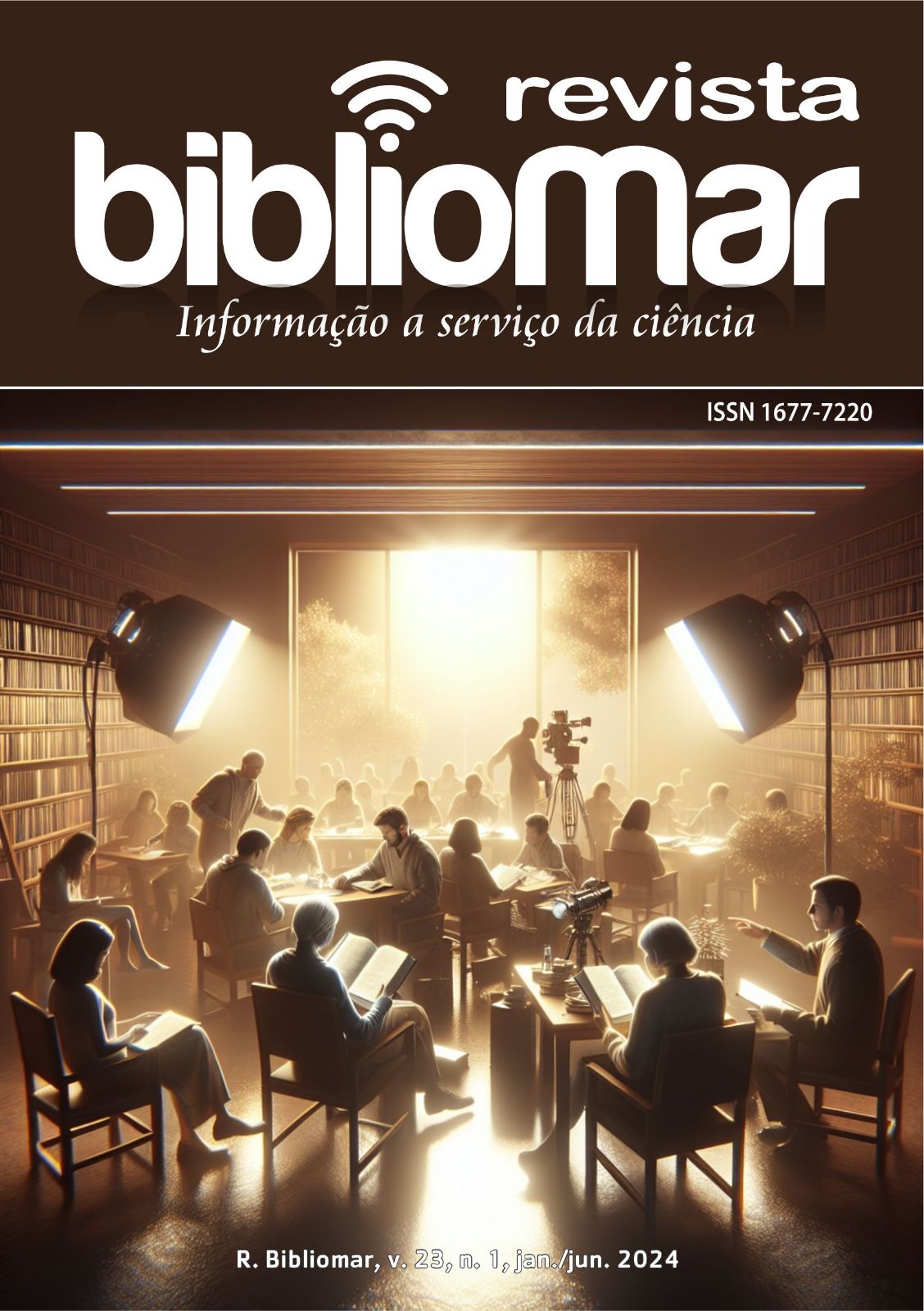Fandom and its creative possibilities in optimizing services offered within libraries
DOI:
https://doi.org/10.18764/2526-6160v23n1.2024.6Keywords:
fandom, libraries, cyberculture, fan relationship, creativityAbstract
This article seeks to clarify the concept of fandom, its importance for cyberculture and influence on fan relationships and their artistic productions. To this end, we investigated how fandom can contribute or assist with its creative possibilities, in optimizing the services already offered within libraries, exemplifying which productions are created by fans in virtual communities, the creative potential of these activities in expanding the original canon, the benefits of using these tools by librarians within libraries, as strategies for optimizing services already offered to their users and potential users. As a methodology for the construction of this work of a basic nature, exploratory research was used with a bibliographical review as its technical nature, using the following theorists ALA (2023); Ferreira Júnior; Feitosa and Costa (2021); Fraade-Blanar and Glazer (2018); Giglio (2011); Gonçalves (2021); Lévy (1999); Merriam (1964); Oliveira (2010); Price (2000); Silva, Sabbag and Galdino (2017) and Silva and Sabbag (2019). As a result, several contributions were identified that fandom productions can bring to the optimization of library services, offering workshops that help these passionate fans to create and disseminate their productions beyond fandom spaces.
Downloads
References
AMERICAN LIBRARY ASSOCIATION. Center for the future of library. Disponível em: http://www.ala.org/tools/future. Acesso em: 30 nov. 2023.
AMERICAN LIBRARY ASSOCIATION. Fandom. Disponível em: https://www.ala.org/tools/future/trends/fandom. Acesso em: 30 nov. 2023.
Fandom. Sobre nós. Disponível em: https://about.fandom.com/about. Acesso em: 30 nov. 2023.
FERREIRA JÚNIOR, José; FEITOSA, Gutemberg de Sousa; COSTA, Ramon Bezerra. O “programa do galinho” na rádio Educadora do Maranhão. Radiofonias- Revista de Estudos em Mídia Sonora, Mariana-MG, v. 12, n. 03, p. 148-162, set./dez. 2021.
FRAADE-BLANAR, Zoe; GLAZER, Aaron M.. Superfandom: como nossas obsessões estão mudando o que compramos e quem somos. Tradução: Guilherme Kroll. 1 ed. Rio de Janeiro: Anfiteatro, 2018.
GIGLIO, Joel Sales. Criatividade na psicoterapia. In: CONGRESSO INTERNACIONAL DE CRIATIVIDADE E INOVAÇÃO: VISÃO E PRÁTICA EM DIFERENTES CONTEXTOS, 1., Amazonas. Anais [...]. Amazonas: [Universidade Federal do Amazonas], 2011, p. 157-169. Disponível em: http://www.criabrasilis.org.br/wp-content/uploads/2019/07/ANAIS-DEFINITIVO-Inser%C3%A7%C3%B5es.pdf. Acesso em: 29 nov.2023.
GONÇALVES. Kayalla Winnie Carvalho. AS FANFICTIONS E SUAS POSSIBILIDADES NA FORMAÇÃO LITERÁRIA DO LEITOR DO SÉCULO XXI. 2021. Trabalho de conclusão de curso (Bacharelado em Biblioteconomia) - Universidade Federal do Maranhão, São Luís, 2021. Disponível em: https://monografias.ufma.br/jspui/handle/123456789/4777. Acesso em: 28 nov. 2023.
LÈVY, Pierre. Cibercultura. São Paulo: Editora 34, 1999.
MERRIAM, Alan P. . Uses and Functions. In: MERRIAM, Alan P. . The Antropology of music. Evanston, Illionis: University press, 1964. Cap. XI, p. 209-227.
SILVA, Bruna Daniele de Oliveira; SABBAG, Deise Maria Antonio. Fandom em bibliotecas públicas: mapeamento de iniciativas e suas aplicabilidades. RDBCI : Revista Digital Biblioteconomia e Ciência da Informação. Campinas: São Paulo, v. 17, p. 1-26, 2019. Disponível em: https://periodicos.sbu.unicamp.br/ojs/index.php/rdbci/article/view/8655370. Acesso em: 28 nov. 2023.
SILVA, Bruna Daniele de Oliveira; SABBAG, Deise Maria Antonio; GALDINO, Rejane. Fandoms e fanfictions: novas perspectivas para o profissional da informação. Revista Brasileira de Biblioteconomia e Documentação, São Paulo, v. 13, p. 1255-1274, dez. 2017. Disponível em: https://rbbd.febab.org.br/rbbd/article/view/942. Acesso em: 03 dez. 2023.
OLIVEIRA, Zélia Maria Freire de. Fatores influentes no desenvolvimento do potencial criativo. Estudos de psicologia, Campinas, v.27, n. 1, jan./mar. 2010. p. 83-92. Disponível em: https://www.scielo.br/j/estpsi/a/YhfMj9CLJcmFZPg7qL9Cnky/?lang=pt. Acesso em: 29 nov.2023.
PRICE, Sally. Arte primitiva em centros civilizados. Tradução: Inês Alfano. [Rio de Janeiro]: Editora UFRJ, 2000.
PRODANOV, Cleber Cristiano; FREITAS, Ernani Cesar de. Metodologia do trabalho Científico: Métodos e técnicas da pesquisa e do trabalho acadêmico. 2. ed. Novo Hamburgo: Universidade Freevale, 2013.
SILVA, Bruna Daniele de Oliveira; SABBAG, Deise Maria Antonio. Fandom em bibliotecas públicas: mapeamento de iniciativas e suas aplicabilidades. RDBCI : Revista Digital Biblioteconomia e Ciência da Informação. Campinas: São Paulo, v. 17, p. 1-26, 2019. Disponível em: https://periodicos.sbu.unicamp.br/ojs/index.php/rdbci/article/view/8655370. Acesso em: 28 nov. 2023.
SILVA, Bruna Daniele de Oliveira; SABBAG, Deise Maria Antonio; GALDINO, Rejane. Fandoms e fanfictions: novas perspectivas para o profissional da informação. Revista Brasileira de Biblioteconomia e Documentação, São Paulo, v. 13, p. 1255-1274, dez. 2017. Disponível em: https://rbbd.febab.org.br/rbbd/article/view/942. Acesso em: 03 dez. 2023.
VARGAS, Maria Lucia Bandeira. O fenômeno fanfiction: novas leituras e escrituras em meio eletrônico. Passo Fundo: Editora Universidade de Passo Fundo, 2015.
Downloads
Published
How to Cite
Issue
Section
License

This work is licensed under a Creative Commons Attribution 4.0 International License.
DECLARAÇÃO DE RESPONSABILIDADE
Senhores editores da Revista Bibliomar,
Declaro que submeti o artigo __________________________________ para avaliação e parecer, e que estou ciente das condições para publicação nesta revista, entre as quais destaco:
a) não há omissão de ligações ou acordo de financiamento entre aqueles que venham a se interessar pela publicação deste trabalho;
b) o trabalho é original e inédito e que não foi enviado nenhum texto similar a este, sob minha autoria, a outro periódico, durante o período em que este texto estiver sob a avaliação da Revista Bibliomar;
c) este trabalho é fruto de pesquisas por mim realizadas e não há omissão de nenhum autor por mim citado.
Respeitosamente,
Loca/data____________, ______/_____/_____
Assinatura do autor(es)
DIREITOS DE PUBLICAÇÃO
Qualquer usuário poderá ter direito de:
- Compartilhar — copiar, baixar, imprimir ou redistribuir o material em qualquer suporte ou formato
- Adaptar — remixar, transformar, e criar a partir do material para qualquer fim, mesmo que comercial.
De acordo com os seguintes termos:
- Atribuição — Você deve dar o crédito apropriado, prover um link para a licença e indicar se mudanças foram feitas. Você deve fazê-lo em qualquer circunstância razoável, mas de maneira alguma que sugira ao licenciante a apoiar você ou o seu uso.
- Sem restrições adicionais — Você não pode aplicar termos jurídicos ou medidas de caráter tecnológico que restrinjam legalmente outros de fazerem algo que a licença permita.






